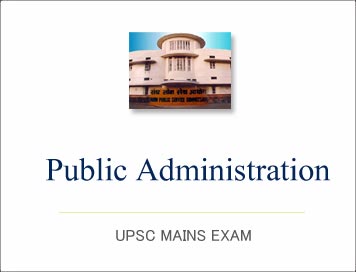(Exam Paper) UPSC IAS Mains 2000: Public Administration
(Exam Paper) UPSC IAS Mains 2000: Public Administration
Paper- I
Section A1. Comment on any three of the following in not more than 200
words each:
(a) “Administrative efficiency is enhanced by keeping at a minimum the number of
organizational levels through which a matter must pass before it is acted upon.”
– (Herbert A. Simon)
(b) “A science of administration would be a body of formal statements describing
invariant relationships between measurable objects, units, or elements.
Unquestionably, administrative research has produced definite precepts and
hypotheses that are applicable to concrete situation.” - (Fritz Morstein Marx)
(c) … ‘a more through consideration leads to the understanding that
communication, authority, specialisation and purpose are all aspects
comprehended in coordination.” (Chester I. Barnard)
(d) “Political environment conditions administrative system.” - (F. W. Riggs)
2. …. ‘The paradigms of public administration may be understood in terms of
locus and focus.” - Golembiewski
In the light of the above statement describe the “five-paradigms” of Nicholas
Henry about the evolution of the discipline of public administration.
3. “Information constitutes the life-blood of the functioning of organization.” In the light of this statement, explain the utility and importance of communication in decision-making.
4. What opportunities are available to All India Services and state services in career development? Do you agree that days of generalists in modern administrative state are numbered?
Section B
5. Write short notes on any three of the following in not more than 200 words
each:
(a) Budget as an- instrument of socio-economic transformation.
(b) Judicial control over administration in India and concept of judicial
activism.
(c) Effectiveness and utility of Central and State Administrative Tribunals.
(d) Work study and work-measurement in Indian Administration.
6. Give reasons for the failure of Government of India to introduce the performance programme budgetary technique in Union Ministries. What type of budgetary system is being currently practised in India and why ?
7. “The weakest aspect of Indian Administrative System is utter disregard of accountability.” Examine the current mechanism for enforcing accountability. What steps are necessary to make it more effective ?
8. Critically examine the approach and methodology adopted by Fred W. Riggs in his study of prismatic and sala societies. What is valid-content of Raj Krishna’s criticism of refraction?
Paper -II
Section A
1. Comment on any three of the following in not more than 200 words each:
(a) “The period of British rule generated most of the structural and behavioural
values of Indian Administration not by imitation but through interaction.”
(b) “Though the dictatorship of the Cabinet is a stark reality in modern times,
it does not mean that the Cabinet is omnipotent.”
(c) “National Development Council, it seems, is like a super-Cabinet.”
(d) “Indian Constitution confers vast legislative powers on the President.”
2. “Among several other problems, the problem of financial relationship is perhaps the most complex one.” Explain in the context of recent developments in Union-State relations in India.
3. (a) “The leadership qualities of a civil servant are test most during his
tenure as the Cabinet Secretary - a dream-post for every bureaucrat.” Elucidate.
(b) “All India Services play a crucial unifying role in the whole administrative
system of the country.” Explain.
4. Discuss the major problems of management and working of Public Sector Undertakings in India. Give suggestions in the light of liberalization policy to improve their performance.
Section B
5. Comment on any three of the following in not more than 200 words each:
(a) “Maintenance of law and order is a State subject but the Union Government
can deploy armed forces in any State.”
(b) “Most administrative reforms have a political cost.”
(c) “It is a major challenge to balance the role of District Collector with the
powers of democratic bodies.”
(d) “A middle way should be worked out to utilize the services of both
generalists and specialists for the national development.”
6. Do you think that our administration is sensitive. to public grievances ? Discuss the existing grievances redressal mechanism and give suggestions for enhancing its capabilities.
7. (a) “Reservation policy and its implementation has had some positive
impact in relation to terms on the socio-economic development of the SCs and STs
but it is very meagre in absolute terms.” Comment.
(b) “In the Chief Secretary, the State Government has an officer whose
counterpart does not obtain in the Union Government.” Elucidate.
8. Do you agree that globalization, liberalization and privatization policies are going to change the very fabric of Indian Administration? What, according to you, are the major challenges before it in the 21st century?


